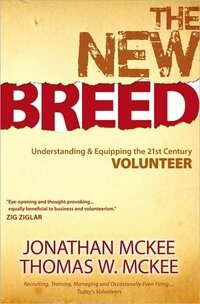Jonathan McKee and Thomas W. McKee, The New Breed: Understanding and Equipping the 21st Century Volunteer. Second Edition. Group Publishing, 2012.
Referenced in: Managing Volunteer Ministry in Church
LifeandLeadership.com Summary
This is a must read for those who work with ministry volunteers. While most who work in these positions prefer to elevate ministry involvement beyond volunteer status into an expression of discipleship, many of the realities of volunteer recruitment, management, and leadership remain. This book thoroughly explains the realities, and provides helpful suggestions. I highly recommend this book alonside Daniel Pink’s Drive: The Surprising Truth About what Motivates Us.
The authors divide the book into three parts:
Section One: The Volunteer Recruiter looks at six seismic shifts that have resulted in the “New Breed” of volunteer
1. Family dynamics: From Father Knows Best to Gilmore Girls – The shift from the nuclear family and stay-at-home moms with discretionary time has given way to many single-mom homes and two-or-more-career marriages with less time for volunteering.
2. Isolation: From community to individualism – Where we once depended on groups like churches and civic organizations for the volunteer pool, we now depend on individuals who focus on a much smaller group of close friends. Nevertheless, this force of individuals has created a swell to where volunteerism is actually on the rise.
3. Flexibility: From rigid scheduling to volunteer availability – Organizations are empowering people to work their own ways according to their own schedules.
4. Generations: From experienced veterans to novice Gen @ – The younger generation willingly volunteers if they believe they can make a difference.
5. Technology: From face-to-face to cyberspace – The “virtual volunteer” opens the door to entire new avenues of volunteering that cross all geographical borders.
6. Professionalism: From skilled workers to knowledge workers – Knowledge workers want to be empowered to make decisions and act on them.
Also in Section One, they authors discuss how volunteer recruitment should be seen more as a courtship. In this respect, there are seven “sins” of recruiting efforts:
Sin 1 – Expecting announcements to work
Sin 2 – Go it alone
Sin 3 – Recruit only those able to make long-term commitments
Sin 4 – Assume “No” means “Never”
Sin 5 – Recruit any BIC (Body In Chair)
Sin 6 – Ask busy people to do busy work
Sin 7 – Recruit professionals who know nothing about volunteer management
This section also provides helpful tips on how to tap into the different motivations of Boomers, Gen X, and Gen Y.
Section Two: The Volunteer Manager
Part two discusses managing and empowering (vs. simply “delegating”) volunteers. McKee’s “Six Rules of Empowerment” are priceless. There are special sections on virtual volunteers and dealing with high maitenance types. The emphasis here on tying tasks to deeper motivations and needs is similar to Daniel Pink’s Drive trilogy of autonomy, mastery, and purpose.
Section Three: The Volunteer Leader looks at volunteer leadership on the organizational level, mobilizing the collective power of volunteers.
Section Four is a collection of resources, including templates for positions, volunteer expectations, projects, codes of conduct, strategic planning and SWOT analysis forms, icebreakers and openers, team-building activities, and sample training exercises.
This is an excellent First Read on volunteer management.
Publisher’s Description
Adapt to the changing world of volunteer management. More than ever, today’s volunteers work online, need flexible hours, and want to play a role in defining their jobs. They also want to feel a sense of responsibility for your organization’s overall mission. Harness this passion and potential—with results that uplift your goals and enable your volunteers.
Includes:
- A profile of the 21st century volunteer.
- The seven deadly sins of recruiting volunteers.
- Framing your recruitment message to Boomers, Gen X, and Gen Y.
- The three levels of motivation.
- The six rules of empowerment.
- Tons of resources! You get ministry job descriptions, applications, and interview questions; activities, icebreakers, and team-builders for volunteer meetings; community-building activities; tips for board retreats and planning sessions; and more!
About the Author
Jonathan McKee, president of The Source for Youth Ministry, is the author of numerous books including the brand new “Candid Confessions of an Imperfect Parent,” and various youth ministry books like, “Connect: Real Relationships in a World of Isolation,” and the award winning book, “Do They Run When They See You Coming?” He speaks and trains at camps, conferences, and events across North America, and provides free resources to adult mentors on his websites, TheSource4YM.com and TheSource4Parents.com. Jonathan lives with his wife Lori and their three teenagers in Northern California.
***For additional information on this resource, including reviews, click the bookstore links. Check the reference at page top or the links below for resource guides on related topics.***
See Resources on Over 100 Areas of Ministry Leadership:


